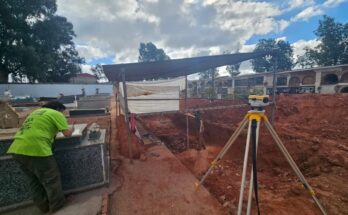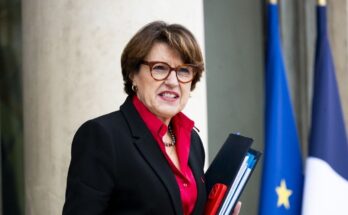The statements of the Guardia Civil agents who intervened in the investigation that brought the State Attorney General to trial led to a tense confrontation between them and the State Prosecutor’s Office, which is defending Álvaro García Ortiz. Lawyer Consuelo Castro focused her speech on exposing the “inferences” reached by the Central Operational Unit (UCO) of the Guardia Civil to identify the Attorney General as the “author of the leak” of the email sent on February 2, 2024 to the Prosecutor’s Office by the lawyer of Alberto González Amador, partner of Isabel Díaz Ayuso and prosecuted for tax fraud. Among other deductions, Castro asked why suspicions are focused on García Ortiz if more than 500 people had access to the Prosecutor’s complaint against González Amador and the email whose leak is being investigated, including at least 16 in the Prosecutor’s Office alone. “We don’t do prospective investigations (…). First, there is a list of people who tend towards a certain one,” said the head of the UCO, who justified this deduction by stating that the Prosecutor’s Office is a “hierarchical institution” in which only the Attorney General has “control of the entire action”.
The 11 UCO agents were the last of the 40 witnesses called to testify in the García Ortiz trial and the last chance for the defense to try to sow doubt in court about who is the author of the leak that is being investigated before García Ortiz’s statement on Wednesday afternoon. The result of these appearances has produced two pieces of evidence: that the UCO is not sure whether it was the Attorney General who leaked the email, but that it has focused its suspicions on him since the beginning of the investigation and maintains them. And the Prosecutor’s Office and the State Attorney’s Office have worked hard to highlight this situation and that the officers’ conclusion does not have sufficient basis to convict García Ortiz.
The defense focused on the report prepared by the Guardia Civil after analyzing the phones and computer of the chief prosecutor of the province of Madrid, Pilar Rodríguez, which is what structured much of the investigation because García Ortiz deleted the contents of his devices and the agents did not find any information by analyzing them. In that report, UCO limits the leak to a group of five people where two circumstances apply: that they had Ayuso’s partner’s lawyer’s email before SER posted it on its site at 11:51 p.m. and that they knew that the Prosecutor’s Office was preparing a press release on its actions in the complaint against González Amador, a detail that was reported in the SER news.
“Why do you assume that the person who leaked the email must be the same person who told the person that a press release would be issued?” – asked the state lawyer.
-Because the emails are in the Attorney General’s Office and the rest (the note) is something that no one knows, an agent underlined.
The report states that this double circumstance that had to occur in the case of the leak “mostly only occurs at the Prosecutor’s Office, so the leak must start from there.” And within the public prosecutor’s office, according to the agents, suspicions may be “limited to the State Attorney General’s Office, the provincial chief prosecutor, the chief prosecutor, the chief economic crimes prosecutor and the economic crimes prosecutor.” “You conclude that these two circumstances occur in four people and in one institution. But ask the judge to analyze the attorney general’s devices,” warned the state attorney, who asked the agents why they did not ask to analyze the phones of others. “Because this person is the one about whom we have the most evidence and because the Prosecutor’s Office is hierarchical,” insisted the agent.
During the UCO’s statements, García Ortiz was seen shaking his head several times and also uttering some words rejecting the officers’ statements to incriminate him. The moment in which the Attorney General was most upset was when one of the guards who participated in the search of his office assured that García Ortiz had told them that he had changed his cell phone shortly before and that the previous one had “destroyed” it. “That word got my attention,” the officer said, as the Supreme Court television feed focused on the attorney general saying, “I didn’t say that.” “Did they record it in the registration log?” – asked the state lawyer. “No,” the guard replied.
The documents from the offices of García Ortiz and the chief provincial prosecutor, Pilar Rodríguez (indicted in the case for several months), have monopolized much of the interrogations of the agents by the Prosecutor’s Office and lawyers, who want the court to annul these actions. To do this, they sought to verify that the court order on which they relied and the actions of the Guardia Civil itself in downloading the contents of phones and computers were “disproportionate”.
González Amador’s lawyer had requested that the communications of the Attorney General and the Provincial Prosecutor be intercepted, but the entry and search order signed by Judge Ángel Hurtado, investigating the case, exceeded the expectations of Díaz’s partner Ayuso. The lawyer had only claimed the exchange of emails between García Ortiz and Rodríguez between March 5 and 18, 2024, and those messages which contained the following text: “After studying the matter, and in mutual agreement with Alberto González, I inform you that it is the firm will of this party to achieve criminal compliance, fully recognizing the facts (certainly two crimes were committed against the public treasury”). sent to the Public Prosecutor’s Office for economic crimes on March 2 and whose leak to the media is considered criminal by the Supreme Court.
But the order signed by Hurtado authorized “the intervention and/or copying, total or partial” of all the contents between the 8th and the day of recording, October 30th. “Seven months and 22 days,” underlined prosecutor Javier Montero. Days later, the instructor corrected himself and told the UCO to only analyze the content between March 8 and 14, but the agents had already downloaded everything. They would have done so anyway, they assured, because “technically” only a part cannot be cloned, assured one of the agents, although others pointed out that on some devices it is possible to select what to copy, but it is very laborious and would take too much time.
Before concluding the speech of the last guards, the president of the court, Andrés Martínez Arrieta, asked: “They tell us that to analyze cell phone data you have to download everything and then filter. For computers, are the mechanics the same?” “Forensic tools allow us to do this, but it is not always possible. The normal thing, and taking into account the good faith of our work, is to make a complete copy and then delete it,” one of the agents responded.



